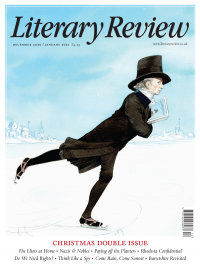Geoffrey Roberts
A Subversive, Not a Psychopath
Stalin: Passage to Revolution
By Ronald Grigor Suny
Princeton University Press 857pp £30
Joseph Stalin kept no diary, wrote no memoirs and evinced little interest in his personal background. He had nothing but disdain for would-be hagiographers among his acolytes. When Mikhail Bulgakov wrote a play about Stalin’s youth, he vetoed its production, saying that ‘all young people are alike, why write a play about the young Stalin?’
Only grudgingly did Stalin accept the utility of a biography that would feed his personality cult. When the first edition of the official Short Biography was published in 1939, he affected to have no time to read it. Although very involved in the preparation of the postwar edition, he complained of it, ‘What should the reader do after reading this biography? Get down on their knees and pray to me?’
Stalin had a particular aversion to fantastical stories about his childhood, urging the burning of a book aimed at young people because it inculcated into the consciousness of Soviet children ‘a cult of personalities, great leaders and infallible heroes’. Another bugbear was inaccurate, laudatory accounts of his early political activities

Sign Up to our newsletter
Receive free articles, highlights from the archive, news, details of prizes, and much more.@Lit_Review
Follow Literary Review on Twitter
Twitter Feed
Under its longest-serving editor, Graydon Carter, Vanity Fair was that rare thing – a New York society magazine that published serious journalism.
@PeterPeteryork looks at what Carter got right.
Peter York - Deluxe Editions
Peter York: Deluxe Editions - When the Going Was Good: An Editor’s Adventures During the Last Golden Age of Magazines by Graydon Carter
literaryreview.co.uk
Henry James returned to America in 1904 with three objectives: to see his brother William, to deliver a series of lectures on Balzac, and to gather material for a pair of books about modern America.
Peter Rose follows James out west.
Peter Rose - The Restless Analyst
Peter Rose: The Restless Analyst - Henry James Comes Home: Rediscovering America in the Gilded Age by Peter Brooks...
literaryreview.co.uk
Vladimir Putin served his apprenticeship in the KGB toward the end of the Cold War, a period during which Western societies were infiltrated by so-called 'illegals'.
Piers Brendon examines how the culture of Soviet spycraft shaped his thinking.
Piers Brendon - Tinker, Tailor, Sleeper, Troll
Piers Brendon: Tinker, Tailor, Sleeper, Troll - The Illegals: Russia’s Most Audacious Spies and the Plot to Infiltrate the West by Shaun Walker
literaryreview.co.uk